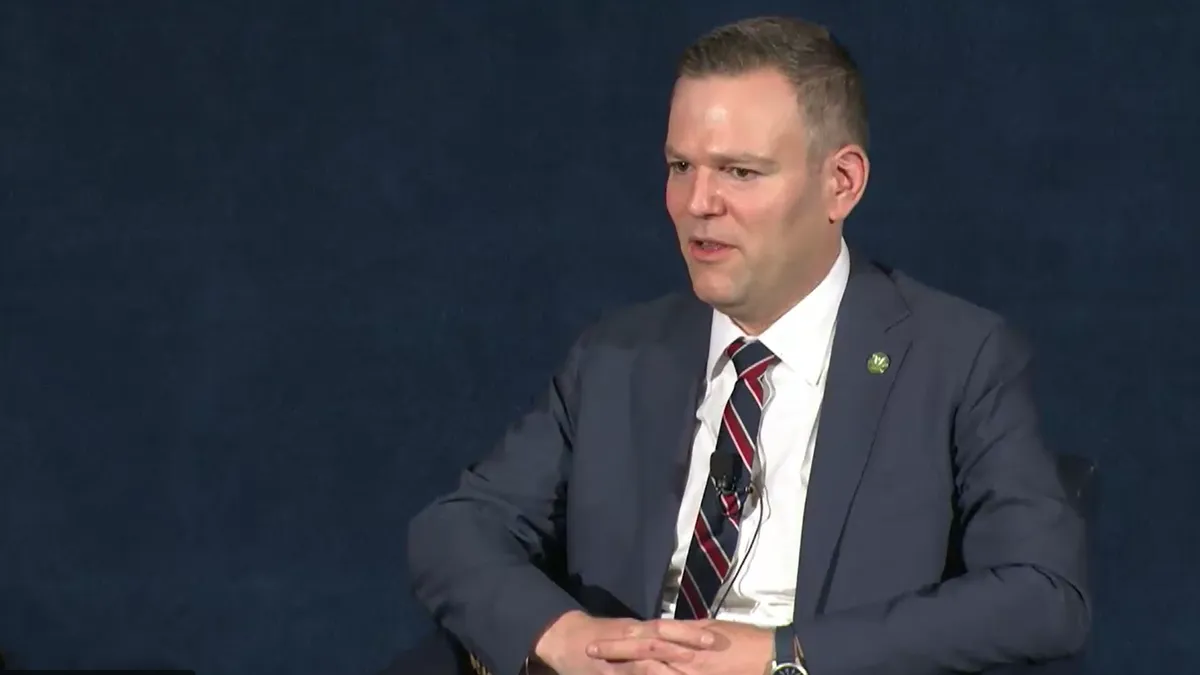David Rosner, a commissioner with the Federal Energy Regulatory Commission, is “hopeful” the agency’s five members will reach a consensus on a pending rehearing order for the agency’s transmission planning and cost allocation rule.
The rule’s requirement that transmission planners consider a set of benefits, such as production cost savings and extreme weather mitigation, when evaluating transmission plans “makes a ton of sense,” Rosner said Thursday during a meeting held by the WIRES Group, a transmission-focused trade group. “One of the goals of my work on a potential rehearing order would be to give states the tools that they need to see the value that the transmission is unlocking for them, and make sure that they have flexibility to adopt whatever benefit they think is needed.”
After FERC issued its transmission planning rule, Republican attorneys general, state regulators, environmental groups and others asked the agency to reconsider its decision. They have also filed lawsuits seeking to overturn aspects of the rule. The appeals will be handled by the U.S. Court of Appeals for the Fourth Circuit.
Commissioners are having “good conversations” on the agency’s reconsideration of its landmark Order 1920 issued in May on a 2-1 vote, according to Rosner.
“I'm just incredibly optimistic that we have a slate of commissioners who are working really well together, who want to find consensus when we can,” said Rosner, who joined FERC last summer along with commissioners Judy Chang and Lindsay See. “We know we probably won't always, but just being willing to try and spending the time together to try is just incredibly important.”
Rosner touted the benefits of reaching broad-based agreements on issues. “Most of my career, I've been really convinced that consensus-driven decision making is the way you get a really good, durable outcome, and you get decisions that have staying power and keep moving the country forward,” he said.
Rosner said his top priorities are grid reliability — balanced with affordability — managing the energy transition and supporting gas and transmission infrastructure development.
Rosner noted that regulatory uncertainty can stifle investments.
“The commission over the past years has gone in a lot of different directions at times,” Rosner said. “If we're introducing a lot of uncertainty, that's raising cost. If we're sending investment signals in places where it doesn't make sense to build, that's not good either. And so I'm a huge believer in some of the reforms that the commission has introduced on the market side,” he said, pointing to effective load carrying capability as an example.
State regulators are telling FERC they are concerned about rising electric bills, especially in regions with market outcomes leading to large price jumps, according to Rosner.
“I'm very concerned about that but I'm also optimistic because one of the things that is happening, at least in one region where we've seen that, is we have state regulators, consumer advocates and generators all coming forward with agreement on certain reforms,” Rosner said without naming the area he was talking about.
Capacity prices in the PJM Interconnection’s last capacity auction soared to record levels resulting in expectations that some utility bills will increase roughly 10% to 20% for a year starting in June. In response to concerns raised by states, power plant owners and ratepayer advocates, PJM plans to delay an upcoming auction so it can revise its rules.
Rosner warned that constant changing of market rules can erode investor confidence.
“We've been up and down and left and right on reforms to some of these markets over the past decade or two and when you meet with people who lend money to people who invest in these things, they sort of tell you things like, we discount that revenue stream to zero, and that is not good,” Rosner said.
Stakeholders and regulators need to figure out how best to reform the markets in a way that keeps electricity affordable and provides regulatory stability, according to Rosner.
However, maintaining grid reliability is part of ensuring affordability, he said. “An unreliable grid is full stop unaffordable because none of our economy works without access to electricity,” Rosner said. That can lead to hard choices, such as determining what transmission project, and at what size and configuration, makes the most sense for a given moment, Rosner said.
Increasing interregional transmission for boosting grid reliability and advanced technologies to make the existing system more efficient appear to make a lot of sense, according to Rosner.
In response to a question about FERC’s consideration of changing its transmission incentive policies, Rosner noted the agency recently issued major rules that require significant compliance work.
“There's a lot of stakeholder fatigue,” he said. “We've asked you all to do a lot, and there's a lot to do … and so, I think it's really important to hear from you and other stakeholders about what the priorities are and where should we focus.”






















